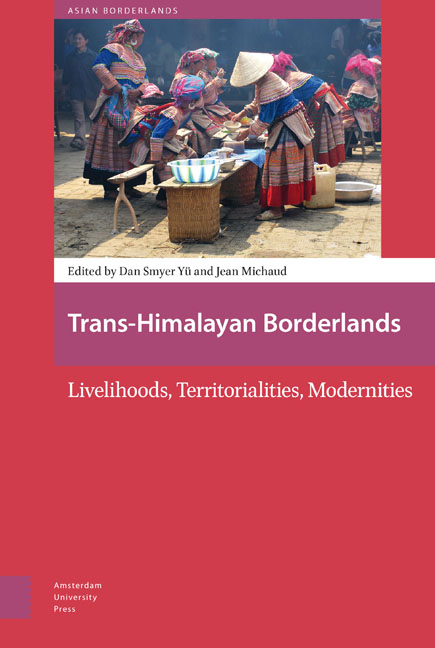Book contents
- Frontmatter
- Contents
- Acknowledgements
- Introduction: Trans-Himalayas as Multistate Margins
- I Territory, Worldviews, and Power Through Time
- 1 Adjusting Livelihood Structure in the Southeast Asian Massif
- 2 The Properties of Territory in Nepal’s State of Transformation
- 3 Trans-Himalayan Buddhist Secularities: Sino-Indian Geopolitics of Territoriality in Indo-Tibetan Interface
- 4 Buddhist Books on Trans-Himalayan Pathways: Materials and Technologies Connecting People and Ecological Environments in a Transnational Landscape
- 5 Seeking China's Back Door: On English Handkerchiefs and Global Local Markets in the Early Nineteenth Century
- II Livelihood Reconstructions, Flows, and Trans-Himalayan Modernities
- 6 Contested Modernities: Place, Subjectivity, and Himalayan Dam Infrastructures
- 7 Plurality and Plasticity of Everyday Humanitarianism in the Karen Conflict
- 8 Being Modern: Livelihood Reconstruction among Land-lost Peasants in Chenggong (Kunming)
- 9 Tibetan Wine Production, Taste of Place, and Regional Niche Identities in Shangri-La, China
- 10 Tea and Merit: Landscape Making in the Ritual Lives of the De’ang People in Western Yunnan
- 11 In-between Poppy and Rubber Fields: Experimenting a Transborder Livelihood among the Akha in the Northwestern Frontier of Laos
- 12 A Fortuitous Frontier Opportunity: Cardamom Livelihoods in the Sino-Vietnamese Borderlands
- Conclusion: Frictions in Trans-Himalayan Studies
- Index
7 - Plurality and Plasticity of Everyday Humanitarianism in the Karen Conflict
Published online by Cambridge University Press: 12 December 2020
- Frontmatter
- Contents
- Acknowledgements
- Introduction: Trans-Himalayas as Multistate Margins
- I Territory, Worldviews, and Power Through Time
- 1 Adjusting Livelihood Structure in the Southeast Asian Massif
- 2 The Properties of Territory in Nepal’s State of Transformation
- 3 Trans-Himalayan Buddhist Secularities: Sino-Indian Geopolitics of Territoriality in Indo-Tibetan Interface
- 4 Buddhist Books on Trans-Himalayan Pathways: Materials and Technologies Connecting People and Ecological Environments in a Transnational Landscape
- 5 Seeking China's Back Door: On English Handkerchiefs and Global Local Markets in the Early Nineteenth Century
- II Livelihood Reconstructions, Flows, and Trans-Himalayan Modernities
- 6 Contested Modernities: Place, Subjectivity, and Himalayan Dam Infrastructures
- 7 Plurality and Plasticity of Everyday Humanitarianism in the Karen Conflict
- 8 Being Modern: Livelihood Reconstruction among Land-lost Peasants in Chenggong (Kunming)
- 9 Tibetan Wine Production, Taste of Place, and Regional Niche Identities in Shangri-La, China
- 10 Tea and Merit: Landscape Making in the Ritual Lives of the De’ang People in Western Yunnan
- 11 In-between Poppy and Rubber Fields: Experimenting a Transborder Livelihood among the Akha in the Northwestern Frontier of Laos
- 12 A Fortuitous Frontier Opportunity: Cardamom Livelihoods in the Sino-Vietnamese Borderlands
- Conclusion: Frictions in Trans-Himalayan Studies
- Index
Summary
Abstract
The chapter is based on nine years (on and off) of ethnographic fieldwork in Karen State, in eastern Myanmar, and examines the grassroots efforts of Karen community-based organizations to alleviate suffering of displaced civil Karen villagers who are caught in the protracted, decades-long brutal conflict. Decades of civil war and repression in southeast Myanmar have created a particular sort of humanitarianism in the borderlands that is characterized by the dense presence of local and international humanitarian organizations. How do humanitarian regimes work on the ground? How are humanitarian regimes in the Southeast Asian Massif influenced by larger geopolitical factors? And most significantly: How did the majority of Karen villagers benefit from humanitarian assistance and how were their livelihoods influenced?
Keywords: Karen conflict, Myanmar, humanitarian assistance, grassroots initiatives, everyday humanitarianism
People in Karen State, in eastern Myanmar, are slowly recovering from posttraumatic stress disorder, anxiety, and depression, following a decade of brutal warfare targeting the villagers in an attempt to cut the support base of the Karen rebels (Karen Human Rights Group 2013, 2014). In this chapter, I shall describe the humanitarian agencies and their work as a transformative project in which local humanitarians were trying to transform crisis into some form of normality. My hypothesis is that humanitarian assistance – organized locally and from below – played a key role in this effort. Hence, I focus on the politics of humanitarian assistance to the Karen to showcase their ‘humanitarian ecology.’ With the resettlement of a Karen refugee elite to the West in the 1990s, the humanitarian economy expanded to the global level as resettled families sent remittances and donated to civil society, the nationalist movement, and missionary churches back home. While ‘humanitarianism’ is defined as a culture of humanitarian assistance, compassion, and relief, I use a broader definition that includes agency, which encompasses a broad range of services – from emergency health care to advocacy work and human rights documentation. Decades of civil war and repression in southeast Myanmar have created a particular sort of humanitarianism in the borderlands that is characterized by the heavy presence of local and international humanitarian organizations.
- Type
- Chapter
- Information
- Trans-Himalayan BorderlandsLivelihoods, Territorialities, Modernities, pp. 167 - 188Publisher: Amsterdam University PressPrint publication year: 2017
- 1
- Cited by



